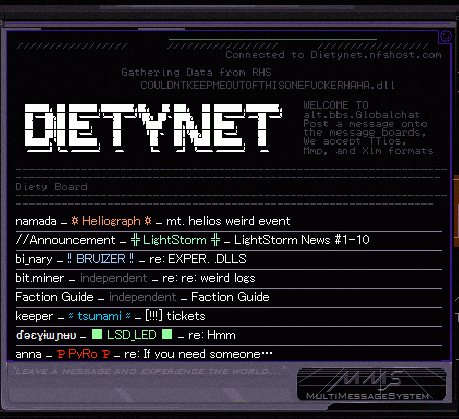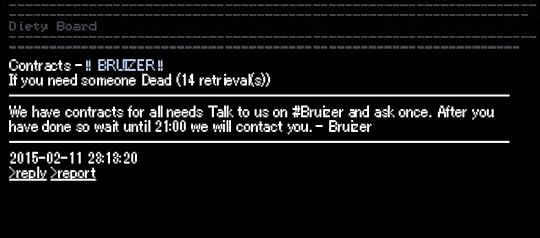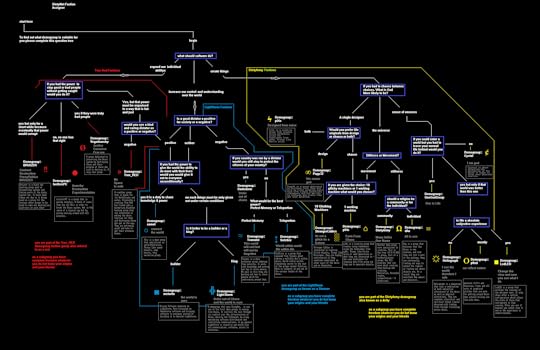Kill Screen Magazine's Blog, page 288
February 24, 2015
Emoji diversity is coming, and not a second too soon
See yourself in your phone.
The semiotics of controller design
Circle, Square, Triangle, and X.
A videogame about exploring the afterlife puts peoples' lives in your hands
Humans have been obsessed with the concept of the afterlife for millennia. Ancient scripture and papyrus dating back as far as 3000 B.C. describes our ensouled body's decay as opening an aperture to another realm, where our conscience can reside for ever after. The Ancient Egyptians and Greeks were convinced of it, and the majority of religions (and our fear of inexistence) have continued to spread the idea of life after death through to today.
administer an anesthetic that will drain them of their life.
But in Ice Water Games's "Antholojam" entry The Absence of Is, it is science that leads us into the first proper study of the afterlife, not a belief system. Not that this is a theological smear, but it does ask questions that are of interest to believers, and has implications for those that aren't. As you'd expect from an empirical approach to this breakthrough, what The Absence of Is wants you to determine is whether or not you've discovered the afterlife based on the evidence you collate. Your answer will depend on the success of your project.
Failure is a constant threat here. And this is no high school experiment, so the risks have heavy consequences riding upon their coattails. Although it is not instructed, you'll soon learn that your role is to compromise the healthy state of three human subjects, shutting down their bodies to bring them close to death. This is necessary to extract the "Sense-Data" from them, which forms an entry point into this other world that you can then briefly venture inside.

If you study the medical records and personal items around the laboratory your subjects will have their personalities revealed. One is the creator of this potentially deadly experiment, another is a young archaeologist and historian, and the third is your wife—no punches pulled. To each you must administer an anesthetic that will drain them of their life. You can watch their vitals drop as you do this. But stare without action for too long, denying these dying bodies the life-saving adrenaline, and you will kill them.
nightmares populated by worrisome symbolism
Not only do you want to avoid doing this as, figuratively speaking, these are people with lives and memories and feelings. You also don't want to cause any deaths as this limits how much of the other realm you're able to explore, missing out on story points and valuable data. It's an empty feeling that grabs at your throat and stomach once the alarms have stopped flashing "DANGER," and you're left with an unchangeable status report—"Dead." Its permanence is haunting, and for that reason, it's almost a shame that it can be resolved by reloading the game and starting over.
Assessing your findings as pertaining to the afterlife (or not) will probably become less pressing the more you see. As what you find inside each pocket dimension is a revealing tableaux of each person's background. There's a fond memory set around the countryside of Korea, a riotous scene of scrambling people and cop cars in Greece, and a concerning picture of domestic violence in a ravaged house. You invade what seem to be the memories and dreams of these people: lands abstracted by torment, nightmares populated by worrisome symbolism, with only the occasional updraft towards something positive.

If this is the afterlife, then it has prepared only death and destruction for these people. If that is the case then we must ask why. Is this punishment for a sinful life? Is it a god's ruinous nature? Or maybe it's the fate of all the deceased? Worse still is the thought that there is no reasoning for it at all, suggesting that we exit life to an eternity of bleak reminders and even more unanswered questions.
You likely won't find any resolve to any post-life queries you may have. But The Absence of Is does give plenty to turn over in your mind. Perhaps most prominent will be the notion that it's best to leave the afterlife to the distant imagination. If it teaches us anything, maybe it's that we should live our lives first, mending them if need be, rather than spending the entirety of our bodily existence worrying about what will happen to us once we retire.
You can play The Absence of Is in your browser. You can also purchase it for $3 on itch.io to get the standalone version.
The impossible architecture of Castlevania: Symphony of the Night
Konami came close to making Piranesi’s imaginary prisons real.
February 23, 2015
Sneak into DeityNet to trade secrets with cyberpunkers
DeityNet is an Alt.BBS community. DeityNet is a Messaging program. It is only for the greatest cyberpunks, Demosceners, and Crack Gangs in the Deios Operating System. If you do not belong to one of those categories then you should stay out. Do not participate. Go away.
This is the warning that I must recite otherwise my service as part of the True_RED Demogroup would be retired. I'd probably be killed. Or maybe not. I don't know, but I do fear the consequences that come with betraying my online peers. That much I'm certain about.
a crystal ball nestled in witchy fingers
DeityNet came into my life when its creator Barch confronted me with it. He issued the warning you read above, the one that I had to give, and then linked the website. The only difference between his welcome and my own was that he added, "I hope you enjoy your stay at DeityNet." I'm not sure if I can honestly hope that for anyone. For if you find pleasure there you, too, will be locked into its strict cyberpunk regulations.
You may know Barch. He's the creator of the glitchventure Deios, of which DeityNet seems to be of the same universe. Despite DeityNet being text-based—an online messaging service—it has been dressed up by Barch's distinct interest in the opulence of noise art and subdued cyber chromatics. It's a treasure just to look at the thing.

When you first open up DeityNet it'll take you a minute or two to adjust to the rich bandwidth of information its interface purports to serve you. Everything looks interactive but it is not. There are sleek grey buttons with glow-lit trimmings, and fonts so bold that they could introduce the kings and queens of outer space. On the right side is a curious image: it seems to be a crystal ball nestled in witchy fingers, daggers for nails. And inside that ball is a crooked tree hanging over what is perhaps an empty highway, and certainly a black-lit canopy hole-punched by stars above its branches.
The interface also has numbered circuitry exposed on its panels, a lone battery sits in a transparent case, and a pink offshoot houses a device called "RF Radio." There's also a timer that seems to be counting down from a 60-day starting point; a second ticking by at a time towards its nameless destination. None of it makes much sense but it is all compelling. You get the same experience upon first diving into the messaging system itself. Press the "GETMAIL" button at the bottom and you'll receive a message. The symbols in the dirty-gold LED display at the bottom left transform into the word "RECEIVING," and up pops your first message with a multicolored subject line.

Opening it up and reading the contents will probably feel like walking into a boardroom and accidentally interrupting a meeting at its middle. It's hard to parse the discussion. In my first three messages, I had someone telling me to "Lightstorm" them, another questioning whether they'd get caught for an act they assumed I was familiar with, and the third was instructions on how to use medical equipment from another world delivered as if I'd asked for it in a hurry. It was perplexing, sure, but it felt like I was sneaking into a secret society, and the thrill of that notion is what led me further in.
these translucent rules and empty threats are what keep it all together
Over time, as I read more and more messages, I started to make connections between the bizarre jargon. I still don't know what this world of cyberpunkers and demosceners is specifically about, and it doesn't matter too much; the idea is to get a feel for it, the language and the attitude, and then contribute yourself. You do this by writing messages in the space provided for composing them on the left, and sending them off to ... whoever. This is how you become accepted into this universe. It's a form of role-playing in which you can't see who you're playing with as communication between you is deliberately limited.
DeityNet reminded me of another program, Space Email, so I asked Barch if it worked anything like it. That is, a way for people to communicate anonymously by sending messages into a database, which are then regurgitated to other users when they ask to receive mail. "It works similar to Space Email but it is factional, based in another CyberWorld away from SpaceEmail - the Deios World," he replied.

He also attached the Faction guide (above), which I had already received through DeityNet's messaging system, and said, "All users impersonating the wrong faction/user will be deleted from the BBS." He then added, in a separate email, as if it were an afterthought, "All users are recommended to follow the Faction guide."
I don't think it's possible to impersonate anyone in DeityNet as it all seems to be made in the mind, with the interface acting as stimuli. But these translucent rules and empty threats are what keep it all together; it's all part of the show. What Barch has done is create the sense of a world behind all of the messages, one that you can pretend to slip into, interpreting the ambiguity as events and characters in the framework of this cyberpunk fiction. It seems appropriate that it is impossible to tell whether the messages are automated by machines or coming from other human players. This, of course, recalls the classic cyberpunk conceit dreamed up by author Phillip K. Dick—how can you discern an android from a human?
So, go ahead, answer the questions in the Faction guide, find out where you belong. And then send and receive messages to weave a story from the blank spaces, mixing in with the machines.
You can play DeityNet in your browser.
Treachery in Beatdown City wants to make a more diverse videogame world
Treachery in Beatdown City looks to change representations of people of color.
Forensic crime dramas go to 19th-century Paris
This just in: apparently there's more to forensic science than the 3D visualization on CSI.
PlayStation Underground as existential crisis
When nostalgia inverts on itself.
Newsgames, and the quiet quest to be worthwhile
There's more to newsgames than stupid quizzes.
Tomb Raider and the riot-grrrl feminism of the ‘90s
The conflicted birth and legacy of Lara Croft.
Kill Screen Magazine's Blog
- Kill Screen Magazine's profile
- 4 followers



